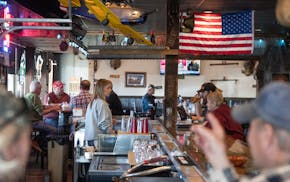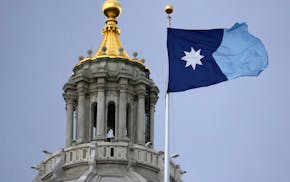Minneapolis officials are crafting regulations that will dictate where and how recreational cannabis can be grown and sold in the city next year, and right now the plan would allow more cannabis dispensaries to be permitted than new liquor stores or tobacco shops.
The proposed regulations would not require any buffer between dispensaries and day cares, residential treatment facilities or public parks because city employees say that would prevent the city from allowing the minimum number required by state statute.
City staff said the Legislature made it clear cannabis businesses should be "available and accessible," so recommended the regulations allow dispensaries in pockets of commercially zoned properties, but require them to be within a contiguous commercial or industrial area of at least 5 acres. The Minneapolis Planning Commission amended that to 3 acres on Monday after a public hearing on the proposed zoning ordinance amendment.
Minneapolis staff had also proposed requiring dispensaries to be at least 500 feet from schools and other dispensaries. Ryan Kronzer, representing the City of Lakes Waldorf School on Nicollet Avenue, asked that the buffer between schools and dispensaries be increased to 700 feet, or the length of a typical north-south city block. But the Planning Commission instead lowered the buffer to 300 feet from schools – the same requirement as liquor stores.
The Minneapolis City Council will later vote on the regulations.
(Sign up for Nuggets, our free weekly email newsletter about legal cannabis in Minnesota.)
The state legalized cannabis in 2023, on the heels of hemp edible products the year before, and cannabis businesses should begin operating next year once the state finishes its rule-making, which is expected early next year. Cities and counties cannot ban cannabis businesses, but can regulate odor, lighting, security and noise from cultivation and retail sales.
Cities can cap the number of cannabis retailers at one per 12,500 residents, but Minneapolis' proposed regulations don't include a cap. City staff said that will give social equity applicants and those "transitioning from the legacy market to the legal market" enough time to get in the business and prevent a "competitive rush."
Earlier this year, state lawmakers allowed "social equity applicants" who get preapproval to grow cannabis to begin cultivating it early, so the city is working to get regulations in place for those growers, along with future business owners. The state gives social equity applicants — including those from communities historically harmed by marijuana prohibition — a leg up on the cannabis competition.
State law allows cities to ban dispensaries within 500 feet of day cares, residential treatment facilities or park attractions used by minors, but Minneapolis staff did not recommend spacing from those, saying that could significantly limit where they could be located and prevent the city from allowing the minimum number required by the state.
The proposal does not require any spacing between dispensaries in downtown zoning districts.
Ben Shardlow, chief of staff for the Minneapolis Downtown Council, told the Planning Commission the council is not opposed to clustering of cannabis dispensaries downtown, saying the market will "come to bear."
"Anyone familiar [with] walking around downtown or in the city of Minneapolis knows that people have access to cannabis, and it's good that we're creating a more organized system," he said.
The owners of Flipside, a hemp store that was just outside a business district where dispensaries could operate under the city staff proposal, successfully lobbied the Planning Commission to lower the 5-acre zoning requirement to 3 acres.
Josh and Tess Fellman said they renovated a long-vacant pet store into a hemp store they planned to convert into a dispensary, but a 5-acre requirement would thwart their plans.
"We've maintained our intent to create a space that elevates what a dispensary experience can be through a well-designed, welcoming environment that helps educate and break the stigma of what cannabis users look like," Tess Fellman told the Planning Commission.
Currently, more than 450 hemp retailers operate in the city, and would need to apply for a state license to sell cannabis.
Planning Commissioner Becka Thompson, who sits on the Minneapolis Park and Recreation Board, opposed the lack of a buffer from parks, and the reduction in the buffer for schools, saying it undermined the school board's recommendation. Planning Commissioner Aurin Chowdhury, who represents the Minneapolis City Council, said there will be more discussion when the proposed regulations go to the council.
Severe weather leaves at least 27 dead, including 18 in Kentucky
Melisa López Franzen drops out of race for U.S. Senate
Sleepless in St. Louis Park: With more night train traffic, city explores whistle quiet zone

As Twin Cities suburbs grow around it, a tiny city fights to stay the same. It's getting harder.

